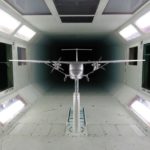Gatwick is to be the first airport in the world to trial autonomous vehicles to shuttle staff across the airfield.
Gatwick’s 300 airside vehicles are stationary 90% of the time, as staff attend to aircraft and passengers, but a trial of electric-powered autonomous vehicles will soon see workers shuttled between popular locations on the airfield.
The trial, set to begin this summer, is thought to be the first of its kind for any airport in the world.
If successful and scaled up, it could be the first step towards widespread use of autonomous vehicles on airfields across the world and could reduce vehicle numbers, emissions and costs.
The pilot study is designed to demonstrate that autonomous vehicles can work safely on an airfield.
Things to come
The project may also be the precursor to a wide range of other autonomous vehicles being used at airports, including aircraft pushback tugs, passenger load bridges, baggage tugs and transportation buses.
No passengers or aircraft will be involved in this trial, which will be limited to airside roads between the airport’s North and South terminals.
The trial will be run in partnership with Oxbotica – a company that develops software which enables vehicles to run autonomously without reliance on GPS or any other technology outside the vehicle. Oxbotica vehicles are also currently involved in other trials on UK roads and the company is developing a fleet of autonomous vehicles that will soon be running between Oxford and London.
Data collected from the Gatwick pilot study could demonstrate that autonomous vehicles can work safely on an airfield, which is a complex environment with a wide range of different vehicle types moving in many directions and both on and off-road systems.
Data collaboration
The data will be used in dialogue with the Department of Transport, Civil Aviation Authority and others. XL Catlin – a global insurance company – is also interested in being part of trial to learn more on autonomous airfield vehicles from an insurance perspective.
If the trial proves the technology fit for purpose for an airport, then additional uses can be explored. IATA – the trade body for the world’s airlines – advocates more than 40 use cases for autonomous vehicles including pushback tugs, passenger load bridges, baggage vehicles etc.
Uber for airports
Cathal Corcoran, Chief Information Officer, Gatwick Airport, said: “If this trial proves successful then in the future we could have an Uber-like service operating across the airfield which staff can hail as and when they need to travel.”
He added: “This trial is just the start and much more research will be needed, but ultimately this could be the beginning of the widespread use of autonomous vehicles on airfields across the world. The new technology is a more efficient way to manage vehicles and could lead to a reduction in the number of vehicles required, emissions and associated costs.”

